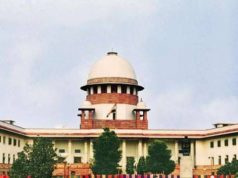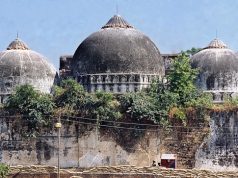

The 15th century Babri mosque in the northern town of Ayodhya, was pulled down by Hindu fanatics in 1992, sparking widespread riots in which more than 2,000 people died.
Hindus claim a temple to their god Ram predated the mosque and want to build a temple at the site, while Muslims want a new mosque. The controversial site has remained a flashpoint of religious tensions for decades.
The Babri mosque case has been heard by Indian courts for nearly seven decades, well before the mosque’s destruction in 1992.
The dispute is one of the most divisive issues in India over the past quarter century. The now ruling Bharatiya Janata Party (BJP) has campaigned for the construction of the Ram temple and repeatedly included it in its election manifestos.
The disputed site in Ayodhya has been fenced off by government and guarded by troops since the mosque was destroyed.
The court observed efforts should be made for an amicable, out-of-court settlement, said Sambit Patra, spokesman of the Hindu nationalist BJP.
“It is an issue of sentiment and religion. First sit together and sort out. Both sides employ moderators and hold meetings,” Chief Justice JS Khehar said, according to broadcaster NDTV.
The court was hearing a petition by BJP leader Subramanian Swamy, who pleaded for urgent hearings as the case has been pending in court for six years.
Swamy said judicial intervention was needed as it was difficult to make both communities sit together, following which the court said it would hear the matter on March 31.
Justice Khehar offered to act as a mediator or arrange for a Supreme Court judge as one, NDTV said.
Subsequently, federal minister Mahesh Sharma said the government would “love to mediate,” but the Babri Masjid Action Committee, which represents the Muslim litigants, rejected an out-of-court settlement.
“There is no possibility for an out-of-court settlement … Efforts [on that front] have been made at the highest levels for the last about 31 years,” the committee’s convenor, Zafaryab Jilani, told reporters.
“If the chief justice nominates some bench to intervene, definitely we have confidence upon the chief justice and his nominated judges, but no private negotiations are possible,” he said.
Communist leader Sitaram Yechury echoed the views. “It is because the talks between the sides did not yield any result, that the matter went to court. The court should now do its job.”
The case has been in the Supreme Court since 2011 when it suspended a high court ruling that the disputed site be split into three parts, with one portion going to Muslims and others to Hindus.
Hindu and Muslim groups challenged the verdict and appealed to the Supreme Court, which criticized the ruling and said the high court overstepped its authority by ordering the partition.
-dpa










